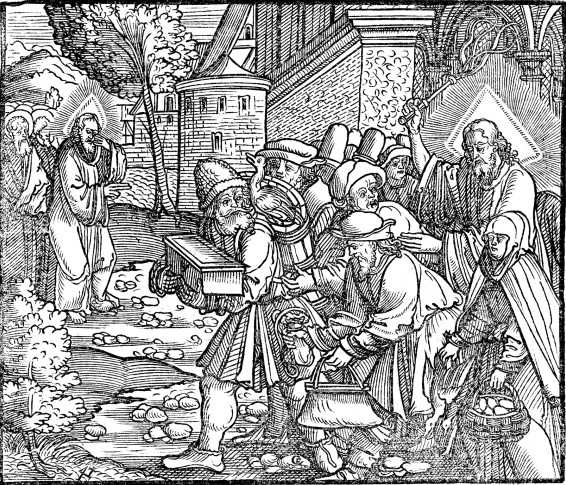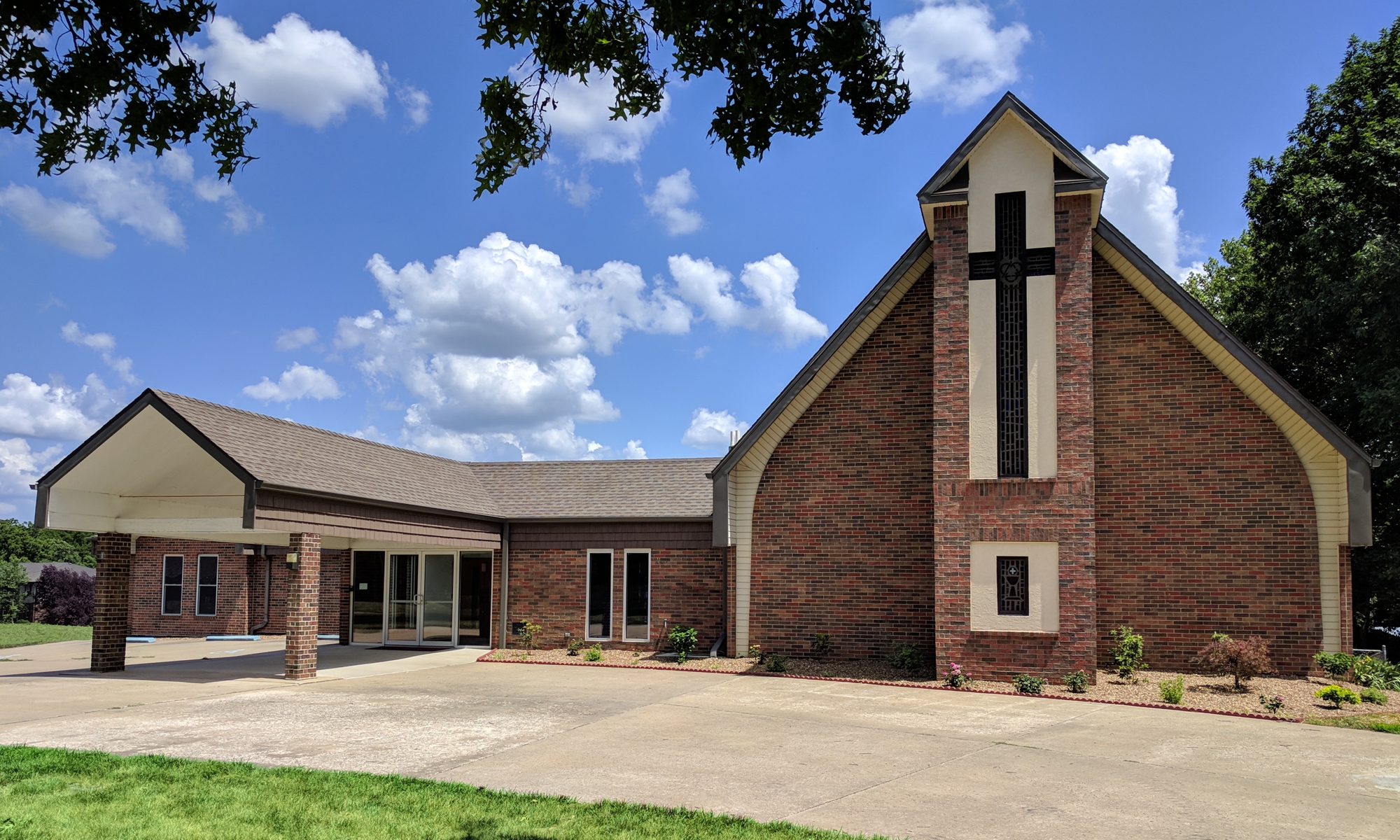
Lessons: Jeremiah 7:1-11, 1 Corinthians 12:1-11, Luke 19:41-48
Hymns: LSB 498, 732, 639, 644, TLH 419
Sermon by Seminarian Joseph Goodroad
In today’s Gospel, Jesus beautifully displays the cooperation of His divine and human natures. Anyone who has returned to visit a place where they used to live understands the deep-seated emotional attachment which we humans assign to locations; to our homes. Well, here is Jesus, God in human flesh, approaching His hometown, Jerusalem. But it’s not His hometown in the human sense. When I say Jesus’ hometown, you may think of Nazareth or Bethlehem, where He grew up and where He was born. But I’m speaking more with respect to His divine nature. Remember, the whole Trinity is eternal; the Son and the Holy Spirit didn’t begin to exist in the New Testament, but they have always existed. Jesus is truly the God of the Old Testament. When God appears or shows His presence by the glory cloud in the Old Testament, that is always God the Son. So, when I speak of Jerusalem as Jesus’ hometown, I am talking about His ancient dwelling place. It is the place which He ordained in the Old Testament to be the meeting-point between God and man, where He would come to be with His people in the temple, delivering the forgiveness of sins to His people through sacrifice. This is His home, this is where He loved to be.
And as the LORD approached Jerusalem, He wept. Jesus wept to see the place which was once the holy city being overrun with those who rejected Him. But far greater than our nostalgia over places is our nostalgia over people. Especially people whom we loved. And these people, these unbelieving apostates who overran Jerusalem, were once God’s chosen people, His treasured possession in all the earth. He loved them, and they loved Him. This was the people which sang the words, “Lord, Thou hast been our dwelling place in all generations,” “The Lord is our God; and we are the people of His pasture, and the sheep of His hand,” “Make a joyful noise unto the LORD, all the earth,” “O give thanks unto the Lord for He is good, for His mercy endureth forever.” Jerusalem was inhabited by His beloved people who had now rejected Him.
But He was not weeping as if He were surprised when He saw the city. Jesus knew throughout His ministry what would happen in Jerusalem, and He knew that what would happen to Him was necessary. Jesus already knew the people’s spiritual state; He knew their denial of the Gospel. He wept when He came upon the city because this tragic knowledge was coming into His sight. When we know something, it may not affect us emotionally until we see it. And when Jesus saw the city, His human emotions displayed His divine love. His eyes beheld in time the people whom He had loved from eternity.
Jesus wept over the people because He desired their salvation, and He was saddened by their apostasy. Jesus said, “Would that you had known on this day the things that make for peace!” That is, He wept that they did not know that He was the Messiah and that He had come to make peace between God and man. AndHe wept just as we also should weep over those who in their synagogues read the Word of the LORD in the books of Moses and the prophets, yet who also deny the Word who has come in the flesh to bear our sin and be our Savior. We should truly weep for them, and we should pray for and preach to those who deny the Messiah yet think they are at peace with the LORD. Peace, joy, and eternal salvation come through Jesus Christ; this is our hope, and the only hope for all mankind.
While Jesus is truly weeping over His ancient people whom He called from the seed of Abraham, His grief over His ancient people is broader than that. And the destruction of Jerusalem which He here prophesied is a foreshadowing of a much greater destruction that will come. It is not only the descendants of Abraham who were created to be God’s holy people, but all the descendants of Adam. The “ancient people” of God includes Adam and Cain, Hezekiah and Nebuchadnezzar, your neighbor and you.
All people were intended for holiness, perfection, faith toward God, and fervent love toward one another. But of course, all have sinned and fallen short of the glory of God. That includes the people of Judah in today’s Old Testament reading, those who were trying to worship Baal and the LORD at the same time. It includes the Corinthians from today’s epistle, who were quarreling over who had which spiritual gifts. And it certainly includes us when we break the same commandments in our own ways. You probably don’t break the First Commandment by literally burning incense to Baal like the Judeans, but you know that you do break this commandment. You do not always fear, love, and trust in God above all things. Similarly, you probably don’t bicker with your fellow Christian about who has the gift of tongues, who has the gift of prophecy, and who has the gift of interpretation, but the root problem in Corinth is still present among us; the problem of covetousness. The sad reality is that this same kind of bickering is still fairly common in the Christian Church across the world. As long as God grants different good belongings, roles, and social statuses to different people, our sinful flesh will covet what someone else has. And this sin is quite serious; apart from Christ, the souls of sinners have only one destination. Just as Jerusalem and the temple were destroyed in A.+D. 70 in accord with Jesus’ prophecy, so also will destruction one day come to the whole world, and eternal condemnation to those who loved this world rather than its Creator.
The latter part of this Gospel, the cleansing of the temple, must be a complete mystery to those who deny God’s wrath, and who think that sin is no big deal. If God didn’t care that much about sin, why would He drive out the merchants from the temple? Jesus is not a laid-back, anything-goes kind of a man, He is the righteous God who despises sin and wickedness. He cannot stand it. Sin is rebellion in His eyes, it is pure evil. And God weeps over this. It grieves Him that we daily sin, and it grieves Him that so many people willingly reject salvation. It is His will to save us all from the doomed fate which we chose for ourselves. Sin is a big enough deal for Him to punish, it’s a big enough deal to rebuke, and it is a big enough deal for the eternal God to die to redeem you from it. God forgives your sins not because they aren’t a big deal, He forgives your sins because He paid for them with His own blood.
In that same vein, the earlier part of this Gospel must be utterly confusing to those who deny that God loves the whole world, even the wicked. Why would Christ weep over the lost if it were His will that they would be lost? Why would He weep over those whom He did not love? Jesus’ weeping is a display of His merciful love toward His whole creation.
Jesus wept, but He did not mourn as those who have no hope. He wept knowing exactly what He would do to remedy the situation; as the Psalmist says, “They that sow in tears shall reap in joy,” and Christ is no exception. Jesus bore your sin in His body, and died on the cross to redeem you from death and the devil. And He rose again from the tomb to open to you the way of everlasting life. These are the things that make for peace between God and man, the saving works of Jesus which He came to Jerusalem in order to do. These are the things Jerusalem did not believe, and the things which He rejoices to make known to you today in the preaching of the Word and in the Sacrament of the Altar. As Jesus shed tears of grief over sin, so also does He now shed tears of joy over your salvation.
Jesus wept over Jerusalem, but He needs no comforting. The ancient dwelling place of God has fallen, but He has a dwelling place. There is a new Jerusalem, described in the 21st chapter of Revelation. There is a truly holy city, where there is no longer any pain, death, or weeping anymore, and God dwells in the midst of her. This is the Church in God’s new creation. This is the promise of eternal life in Christ which God has given to all who are baptized in His name. The dwelling place of God is with man, He will be with them, and He will wipe away every tear from their eyes. The mercy and steadfast love of God is your eternal paradise.

